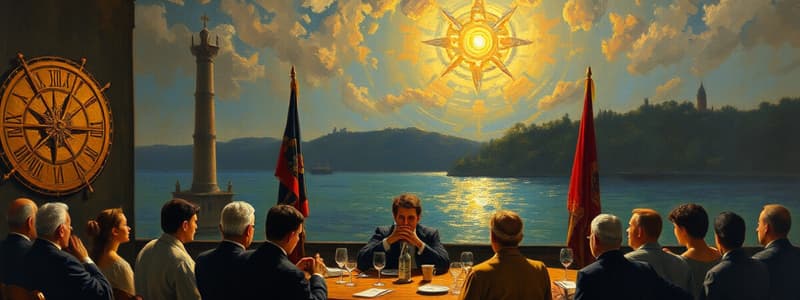Podcast
Questions and Answers
What is the League of Nations?
What is the League of Nations?
An international organization established after World War 1 to preserve world peace by preventing future wars, settling disputes through negotiations, and providing protection to weaker countries.
What did the Second World War (1939) prove?
What did the Second World War (1939) prove?
The League of Nations was a failure.
Once the Second World War ended in 1945, the League of Nations became what?
Once the Second World War ended in 1945, the League of Nations became what?
The United Nations.
Was Woodrow Wilson the only person who promoted the establishment of the League of Nations?
Was Woodrow Wilson the only person who promoted the establishment of the League of Nations?
What does LEP stand for?
What does LEP stand for?
What did LEP propose?
What did LEP propose?
Where was the British League of Nations Society founded?
Where was the British League of Nations Society founded?
Which statesmen committed themselves to the League of Nations throughout their lives?
Which statesmen committed themselves to the League of Nations throughout their lives?
Who published a treaty entitled 'The League of Nations: A Practical Suggestion'?
Who published a treaty entitled 'The League of Nations: A Practical Suggestion'?
Woodrow Wilson was known as what?
Woodrow Wilson was known as what?
What is the League of Nations Covenant?
What is the League of Nations Covenant?
At the Paris Peace Conference in 1919, who made up the multinational commission to set up the League of Nations Covenant?
At the Paris Peace Conference in 1919, who made up the multinational commission to set up the League of Nations Covenant?
What happened on April 11th, 1919?
What happened on April 11th, 1919?
What did Woodrow Wilson suggest be included in the peace treaties that emerged from the Paris Peace Conference?
What did Woodrow Wilson suggest be included in the peace treaties that emerged from the Paris Peace Conference?
What did Woodrow Wilson do while he was ill?
What did Woodrow Wilson do while he was ill?
When was the League of Nations formally established?
When was the League of Nations formally established?
What did each member have to do?
What did each member have to do?
What were the aims of the League of Nations?
What were the aims of the League of Nations?
Aim 1: Prevent future war.
Aim 1: Prevent future war.
Aim 2: Administering the post-war settlement.
Aim 2: Administering the post-war settlement.
Flashcards are hidden until you start studying
Study Notes
League of Nations Overview
- An international organization founded after World War I aimed at preserving world peace.
- Intended to prevent future wars, mediate disputes, and support weaker nations against aggression.
League's Efficacy
- The onset of World War II demonstrated the League's failure to maintain peace.
Transition to United Nations
- Following World War II in 1945, the League of Nations was succeeded by the United Nations.
Support for Establishment
- Woodrow Wilson was a key advocate but not the only supporter of the League's establishment.
League to Enforce Peace (LEP)
- Established in 1915 in New York by notable citizens, including former President William Howard Taft.
- Proposed joint economic and military action against member nations that engaged in war or hostility.
British League of Nations Society
- Founded in London as part of the broader advocacy for the League.
Lifelong Advocates
- Notable statesmen committed to the League included Robert Cecil, Leon Bourgeois, Paul Hymans, and Jan Smuts.
Jan Smuts' Contribution
- Published 'The League of Nations: A Practical Suggestion' advocating for the League.
Woodrow Wilson's Advocacy
- Recognized as a major proponent of the League, eventually winning the Nobel Peace Prize in 1919.
Covenant of the League
- The League operated under a set of rules known as the Covenant.
Establishment of the Covenant
- At the 1919 Paris Peace Conference, a multinational commission, including representatives from key nations, drafted the Covenant.
Draft Acceptance
- On April 11, 1919, the commission accepted a draft covenant with minor amendments, with further changes in 1924.
Inclusion in Peace Treaties
- Wilson insisted the League of Nations Covenant be part of the peace treaties emerging from the Paris Peace Conference.
Wilson's Advocacy During Illness
- While ill, Wilson traveled the U.S. to promote the League's importance both domestically and globally.
Formal Establishment Date
- The League of Nations was formally established on June 28, 1919, as Part 1 of the Treaty of Versailles with 42 founding member states.
Member Obligations
- Each member was required to sign the Covenant, outlining the League's structure and operational methods.
Aims of the League
- The primary goals included preventing future war, managing post-war peace settlements, and promoting international cooperation.
Preventing Future War
- Aimed at avoiding conflicts like WWI by:
- Promoting disarmament (Article 8).
- Abolishing secret diplomacy (Article 18).
- Encouraging arbitration for dispute resolution (Article 13).
- Establishing collective security (Article 16) for member nations.
Administering Post-War Settlements
- Included arranging plebiscites (e.g., Saar Valley issue) and organizing mandates for territories post-war.
Studying That Suits You
Use AI to generate personalized quizzes and flashcards to suit your learning preferences.




